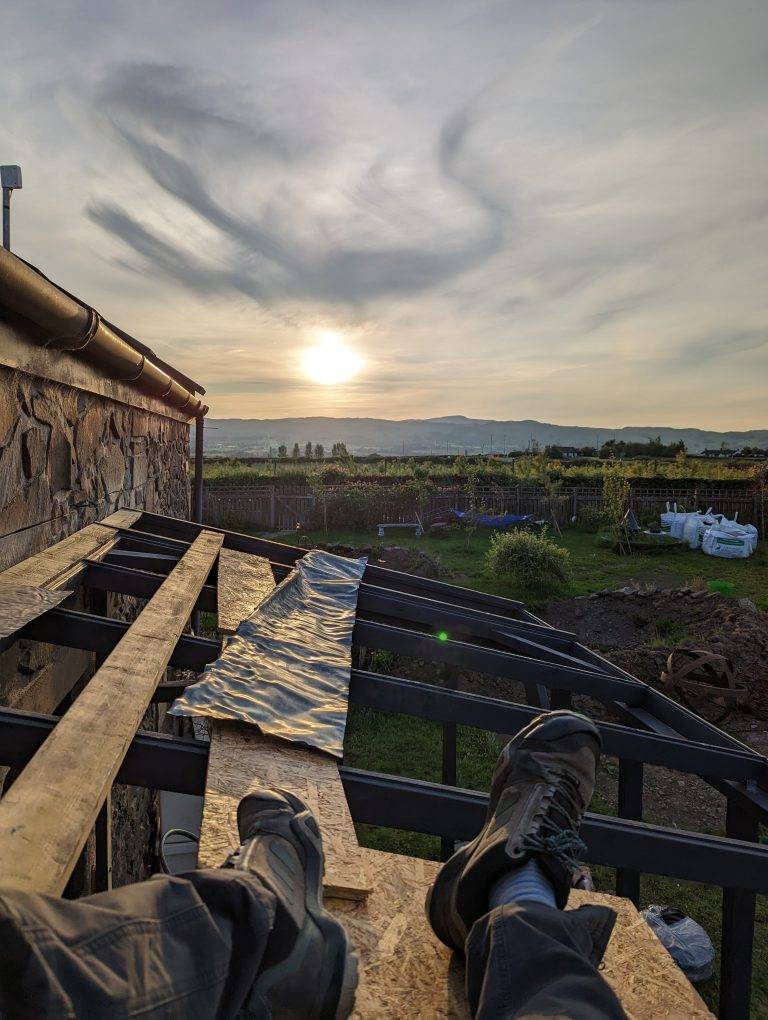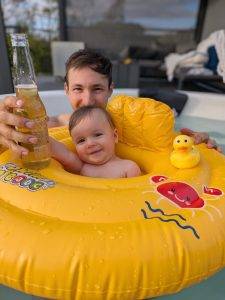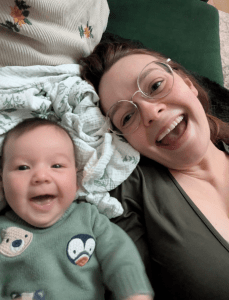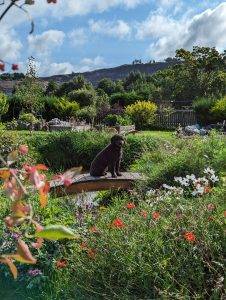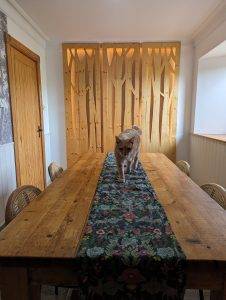Achieving work-life balance is not possible or even desirable.
In the last year I’ve juggled:
- growing Design Hero,
- writing Life by Design,
- building my new office,
- renovating the house
- landscaping the garden
And I’ve struggled with balancing it all. At times my wife and I worked ourselves to the bone.
Mentally exhausted, physically exhausted, tired of it all, wondering why we decided to take these projects on.
I had already used all the tools in the Solopreneur’s playbook:
- I cut any unimportant tasks,
- I delegated
- I delayed
- I eliminated.
But prioritizing didn’t work, because all of the tasks remaining were important.
As a highly task-oriented person, overwhelm is something that hits me hard.
The pressure I put on myself to complete tasks is huge.
Eventually, it all came to a head and I had a mini breakdown over starting a task that wasn’t even on the todo list until next year.
And after I’d calmed down and realised it wasn’t such a big deal if this didn’t get done after all, I had a major realization which helped me reframe my concept of balance.
I realized balance is not a time problem.
balance is a psychological problem.
Balance is a state of mind
I’m sure you can recall a time when you’ve been very busy, perhaps even stressed, yet utterly content.
A rewarding project requires attention, effort and struggle, yet it is these states of flow that are often when we are happiest.
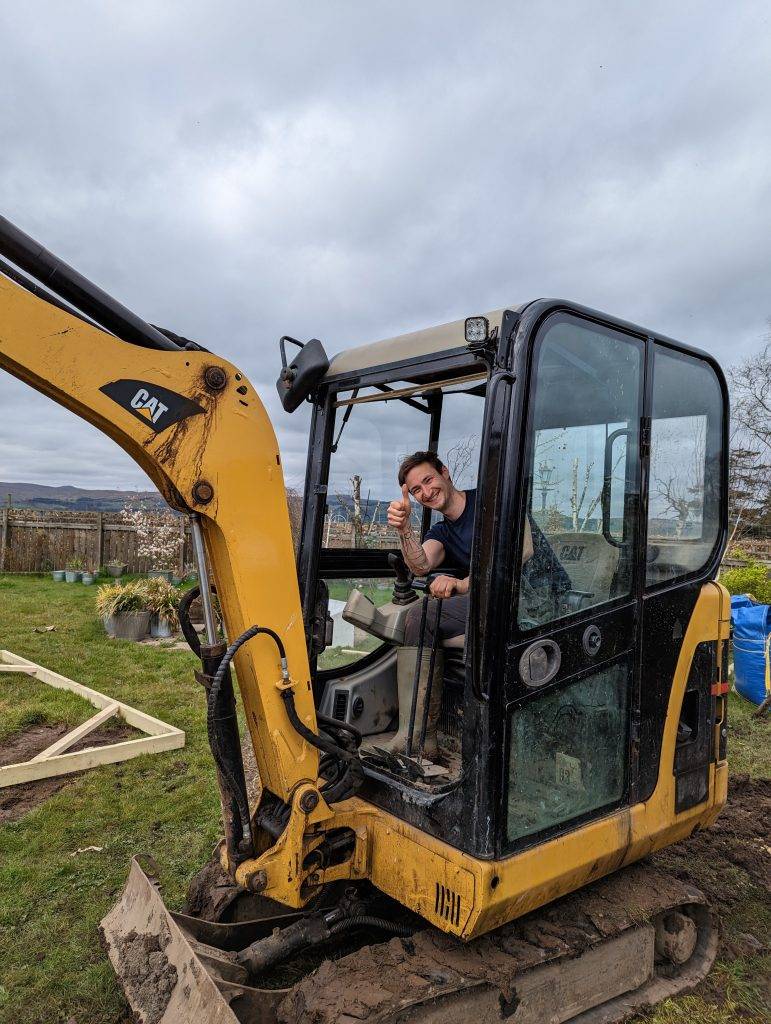
At this time my life was not balanced, as most would describe it:
I was overworked, tired, stressed and exhausted, working 80 hour weeks between the various projects.
Working on these grand projects on my own patch gave me an enormous sense of well-being and contentment.
My sense of “balance” came from working on personally rewarding projects with a strong sense of purpose.
It was actually only after the bulk of these projects came to a conclusion that the crash came.
My brain had become accustomed to being constantly active, and the switch back to a state of rest was too sudden. My poor brain struggled to adjust and rebalance itself, and was flailing blindly for more tasks to complete.
I used to think of myself as a stable person. I don’t have deep craters of emotions or tall waves of emotion that plagues some of my more extroverted peers.
So when I started working for myself, I found that I was less stable than I had thought.
I find I often struggle with two competing sides of my nature craving two opposing things:
- Ambitious Goals
- A simple life
There are times when my ambition takes over and I chase goals and targets,
I have an insatiable need to be better, do more, and achieve MORE.
and then there are times when I simply don’t see them as important, and would rather cling to a feeling of stability.
Is balance always positive?
People are always chasing balance.
It’s assumed balance = good, extreme = bad.
An ironic truth:
To achieve great things requires imbalance.
- Edison obsessively tested 10,000 failures before he invented the light bulb.
- Van Gogh chopped his own ear off in a fit of artistic delusion
- Abraham Lincoln attributes his own success to his depression.
Focus, by definition, requires ignoring the unimportant.
But these are the extreme of the extremes.
We don’t need to take such an extreme path through our whole life.
It’s possible to focus on a specific objective, for a defined period of time,
then rebalance in phases to achieve an overall balance.
I often feel at war between two versions of myself:
- my ambitious self who wants to build something great and lasting
- my self who wants a simple, unfettered life
I have no wish to live an extreme life.
It’s a spectrum,
and we all must decide for ourselves where we sit on that spectrum,
between greatness and extremity,
or normality and mundane.
🙏🏻 balance in all things.
You can’t have everything. Sometimes focus requires letting other things slide
I’ve found a mental framework that helps me address this, and somewhat smooth the peaks and troughs of this internal conflict.
Life isn’t a sprint OR a marathon…
There’s a lot of debate over whether business is a sprint or a marathon.
The conventional wisdom is that it’s a marathon and trying to “sprint” will lead to burnout.
I disagree.
Anyone can sprint 100m.
But very few people can run a marathon.
If you start trying to run a marathon, you’re going to fail, and probably bust a knee!
So I find it more helpful like to think of life as series of sprints.
I push hard on a project, then I rest and rebalance.
This allows for constant, consistent growth, in both personal and career contexts, over a longer period of time, than trying to constantly grind 26.2miles, then collapse exhausted at the finish line (only to realize there’s another marathon to run tomorrow).
So think of life as a series of sprints, with a fixed purpose for each sprint, but also fixed end points.
Most people can cope with struggle when they know the end is in sight.
How does this apply to lifestyle design?
Just as life is a series of sprints,
when it comes to lifestyle design, I also find it helpful to think of your life as a series of moments strung together.
Lifestyle is not your achievements and milestones,
lifestyle is nothing more than the sum of things that you do every day.
Designing your life doesn’t mean setting goals for
- the car I want to buy
- the money I want to meet per month
- the holidays I want
Instead, it means choosing what I want my daily life to look like and organising my daily schedule and activities into this.
It means having a clear idea of where I want to be in five years time breaking that down into actions and taking those actions every day whether you feel like it or not.
Of course, not everyone has total freedom over their time to do this.
But regardless of whether you work for yourself, have one day a week for an hour you still have control over what you do in that time.
If you want to achieve more freedom in future, you’ll probably have to give up time in the present to make it happen.
I have a lot of freedom now. But for many years I worked evenings & weekends on top of a full-time job to…
- Learn skills
- Chase leads
- Build systems
- Do the work
Building a 6 figure lifestyle business is extremely rewarding, but it’s not easy.
It helps to design our life in a series of sprints, with fixed end dates to allow time for recovery, reassessment and rebalancing.
Subscribe for instant access to my frameworks for preventing and curing burnout.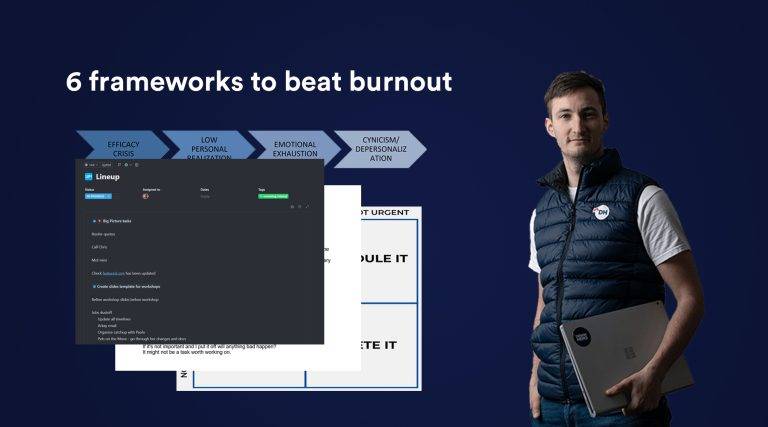
There are x6 frameworks I use to prevent, reduce & cure burnout.
Daily actions, repeated every day = your life
Small daily actions will have a far bigger impact over your lifestyle then setting grand goals chasing them hard for a week and in reverting back to the norm.
My own schedule contains a mix of work, play, rest exercise and maintenance. I don’t relegate play to the weekend or evening, but try to mix it into my daily routine.
For someone highly task oriented this is harder than it seems.
My own default is to stay glued to the screen churning through tasks like there’s no tomorrow.
Tearing myself away to do something for myself, ironically, takes willpower.
That’s why I try to design my lifestyle first and my business second.
A detailed schedule, with time set aside for downtime, thinking, housework, will help keep you on track,
and override your natural defaults to simply work harder…
or vice versa, override your natural default to watch Netflix instead of doing the important work.
Many people don’t take the time at all to design either their life, or their business.
It’s amazing to me how many people go through life feeling that life just happened to them.
Or worse, that life is passing them by.
This becomes painful to deal with mentally, so they set grand plans to move abroad, book more holidays, achieve an income target etc.
Why fixed outcome goals can lead you astray
But here, the modern obsessions with goal setting is misleading.
Setting goals and targets without actions that take you there is nothing more than wishful thinking.
Projects don’t have neat start and endpoints.
Not every task can be started and finished.
This leads to unsatisfying nags on our brains.
brains crave completion.
When you don’t meet your goal, you’re going to feel pretty crap about it.
Setting grand, unrealistic goals won’t help you change your life, in fact, it will only make you feel like more of a failure for not having the life you want.
When people talk about work life balance, they are usually talking about separating their life activities from their work activities.
Common logic would have you believe that somehow we can “balance” full time work, and full time personal lives.
Separate, but equal….except guess which one always comes first?
This leads us to think of our work as “the day”,
and our home life as secondary to that, arranged around evenings and weekends.
That’s no way to live…
Life doesn’t work that way:
When you eat a tasty meal you don’t separate all the ingredients and eat them one by one.
The beautiful flavours come from eating a combination of tasty ingredients.
Balance usually means holding things simultaneously in harmony. Here’s some definitions I’ve picked out:
a situation in which different elements are equal or in the correct proportions. (noun)
but I think the verb is far more accurate in this context:
offset or compare the value of (one thing) with another.
Balance” is a continuum, not an endpoint
In the verb, “balance” means giving up one thing, to prioritize another.
balance is not something to be achieved or a goal,
balance is a constant fluid act, balance and rebalance.
Want to focus on business growth?
You may have to give up on weekends for a while.
Want to spend time with family?
You can’t work 24/7 on the business.
You will have to let something slide, only to prop it up later.
This is one reason why running a solo business is so attractive to me:
My wife regularly has to work 80 hour shifts. her shifts are often random, and follow little pattern.
She doesn’t have the same freedom that I do
So if she is off, then I like to make time to be with her,
which means structuring my business in such a way that my own schedule can handle random breaks,
and things don’t fall apart. This means we can enjoy breakfast together, go out for spontaneous walks or lunch if she has free time.
A solo business allows me the flexibility to rebalance my priorities as I see fit,
instead of having to arrange my life around someone else’s priorities.
If you want to change your life, ask the right questions
If you want to work by yourself, 4 days a week and earn £10k/m,
then you need to reverse engineer your lifestyle to fit those goals.
- write the specific steps.
- break the steps into a repeatable action you can do every day in an hour or less.
- work that into your schedule.
- repeat for as long as it takes!
👆 Simple, not easy
Set a direction, not a goal
Most people ask
“How can I balance my work and life”
A good question would be
“how can I organise arrange my job around my life?”
A great question would be
“how can I integrate my job within my life so that I don’t need to balance them?”
It might be less exciting than setting grand 5 year plans,
but a daily schedule is how to reliably keep yourself working on the right things everyday.
Working on the right things every day is what will get you to the 5 year goal.
Most people set goals, set off running and collapse after a few days, or weeks, or months.
Walk in the right direction every day, over a long enough timeline eventually, you’ll get there.
And you’ll probably enjoy the stroll more too.
🏔️ Just keep in mind, that once you get “there” you’ll only have to set another destination.
That’s why you have to focus on the process, not the endpoint.
Enjoy the climb, not the summit. It’s a cliche, but it’s true.
How to enjoy the process
Writing the plan is the easy bit.
sticking to the plan is the hard part.
This is where it helps to shift your mindset.
Building anything great takes years.
It’s not always fun. In fact often it’s very boring. And sometimes even painful
If you’re going to spend years of your life sacrificing for a longer-term goal, then make sure you’re enjoying the process.
Don’t focus on growing 5,000 followers, focus on enjoying the act of writing.
Don’t focus on making £10k/m, instead enjoy improving the value of your offer,
Don’t focus on how many clients you have, instead focus on practising your sales skills with each call.
Anything great requires sacrifice
This is why achieving work-life balance is not possible or even desirable. When people talk about work life balance, they are usually talking about separating their life activities from their work activities.
They give all sorts of advice on how to partition your work,
To optimize your time,
Or to prioritize your activities within your work day.
But these solutions all focus on time.
Balance is often thought of as a time problem.
Balance is a psychological problem.
In fact balance is not even a problem, unless you believe that some of your basic requirements aren’t being satisfied due to other obligations.
I’m sure you can recall a time where you’ve been very busy, perhaps even stressed, yet happy at the same time.
A rewarding project requires attention, effort and struggle, yet is often when we are most absorbed.
Balance is mostly a state of mind, where we are unsatisfied with the arrangement of our lives,
or stressed at our inability to “fit it all in”
Sometimes it means working hard on personal project,
or giving up luxuries to save for a deposit on a house,
or giving up your time to do charity work.
We all instinctively know that balance means giving something else up, to prioritize something else.
But with time and practice, you can get better at this:
- mentally holding conflicting goals in your head,
- design your life in a series of sprints with specific outcomes,
- rebalance your schedule
- adjust the trajectory of your life.
And above all, accept that you simply can’t do it all at once.
Remember, your daily actions = your life.
Be sure to leave room for the things you actually want to do.
If you’d like some help designing and planning your ideal lifestyle, you can download my daily planner here.
Subscribe for instant access to my frameworks for preventing and curing burnout.
There are x6 frameworks I use to prevent, reduce & cure burnout.

